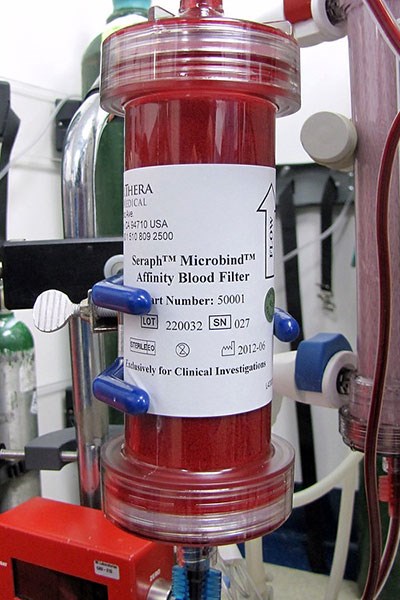ExThera’s Seraph 100 Filter Granted Emergency Use Authorization by the FDA

Bob Ward ’71, ’12 (H) and his wife, Gail, during a previous visit to the Saab Emerging Technologies and Innovation Center on North Campus
10/08/2020
By Edwin L. Aguirre
Bob Ward ’71, ’12 (H) has earned a national reputation for the breakthrough technologies he has developed for the medical device industry. When the COVID-19 pandemic hit, he turned his attention to applying his company’s technology to help treat patients suffering from the coronavirus.
Ward, the president and CEO of ExThera Medical Corp., a privately held medical device company based in Martinez, California, and in Vaals, The Netherlands, is using an innovative filter that he invented to capture and remove SARS-CoV-2, the virus that causes COVID-19, from the blood of infected patients.
The filter — called the Seraph Microbind Affinity Blood Filter, or Seraph 100 for short — is an external, single-use medical device designed to remove many pathogens, toxins and other disease-causing contaminants quickly and safely from whole blood.
“There is currently no other blood-purification therapy known to bind and remove the SARS-CoV-2 virus/RNA while also improving the patient’s vital signs and laboratory parameters associated with inflammation and tissue damage,” Ward says. “The technology can be applied not only to COVID-19 patients, but also to dialysis patients who frequently get bloodstream infections, and to cases of non-COVID sepsis and septic shock, even when drug-resistant pathogens are involved.”
In the spring, the Seraph 100 was tested by the U.S. Department of Defense (DOD), for the first time in the U.S. on ICU patients with COVID-19 at the Walter Reed National Military Medical Center in Bethesda, Maryland. The success of these early cases, as well as the promising results obtained from hospitals in Europe, led to ExThera being granted emergency use authorization by the U.S. Food and Drug Administration (FDA). A DOD-funded multicenter trial of COVID-19 treatment using Seraph 100 was launched this fall.
According to ExThera, upwards of 150 critically ill COVID-19 patients, including those with simultaneous preexisting medical conditions, or comorbidities, have been treated with Seraph 100 after showing serious symptoms of the virus. Early case reports suggest that Seraph 100 increases survival by stabilizing blood pressure and decreasing inflammatory biomarkers that correlate with poor patient outcomes, in part by reducing coronavirus concentration in the bloodstream.
Because early Seraph 100 treatments for bacterial infections consistently produced improved oxygenation and lung function, Ward believed that this feature, together with the reduction in virus concentration, would be a useful combination for COVID-19 while simultaneously treating the dangerous secondary bacterial and fungal infections that can occur in patients with the virus.
Combating Blood-borne Pathogens

ExThera Medical’s Seraph Microbind Affinity Blood Filter
“Seraph does not add anything to the blood, which is returned to the patient with blood cells and proteins intact,” says Ward.
He adds: “Under the FDA’s emergency use authorization, Seraph 100 has quickly made its way into the hands of U.S. clinicians. Current demand is increasing exponentially.”
An ‘Excellent Value for the Money’
Throughout his career, Ward has been an innovator and inventor. He has nearly 50 years of experience in research, development and manufacturing of medical devices and novel biomaterials used in hundreds of devices and prosthetic implants, such as pacemakers, orthopedic implants, vascular grafts, catheters, contact lenses, implantable glucose sensors and artificial hearts.
Ward also holds more than 60 U.S. patents and has co-authored more than 50 papers in peer-reviewed journals.
Before taking the helm of ExThera, Ward was founder and president/CEO of the Polymer Technology Group in Berkeley, California, now DSM Biomedical. Prior to this, he served in various executive management positions at Thoratec Corp. and Avco Medical Products in Everett, Massachusetts.
He earned a bachelor’s degree in chemical engineering from UMass Lowell and studied engineering management and polymer science at Northeastern University.
Ward says the education and training he received from UMass Lowell went a long way in helping to launch his career. “The university offered excellent value for the money,” he says. “My engineering education has allowed me to do just about anything professionally.”
In 2012, the university conferred an honorary Ph.D. on Ward for his lifelong pioneering work in biomaterials and medical devices. And in 2018, he was elected member of the National Academy of Engineering in recognition of his accomplishments in the development and commercialization of biomedical devices and prosthetic implants.
To date, he and his wife, Gail, have given nearly $2 million in philanthropic contributions to UMass Lowell to further advance its mission. The Wards have established the Robert and Gail Ward Biomedical Materials Development Laboratory at the Saab Emerging Technologies and Innovation Center on North Campus, the Ward Family Chemical Engineering Endowed Scholarship Fund and the Robert and Gail Ward Endowed Professorship in Biomedical Materials Development.
Beginning in 2012, the Robert and Gail Ward Endowed Professorship has provided financial assistance over a two-year period to a professor in the Department of Chemical Engineering to conduct research on biomedical materials and devices.
Prof. Al Donatelli was the recipient of the endowed professorship in 2019. Next year’s professorship is awarded to Asst. Prof. Gulden Camci-Unal, who has conducted groundbreaking research in biomaterials and tissue engineering using paper, eggshells and hydrogels. Camci-Unal also recently developed a simple, rapid test for detecting the coronavirus in body fluids. She will receive funding for fiscal years 2021 and 2022, totaling more than $26,000.
“It is a tremendous honor to receive the Robert and Gail Ward Endowed Professorship,” says Camci-Unal. “With this award, I am pursuing research to develop novel biomaterials to help solve problems in life sciences and medicine. The funding will provide great opportunities for my laboratory. I am extremely grateful to Bob and Gail for their support.”
